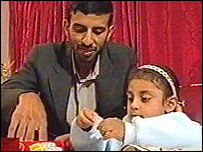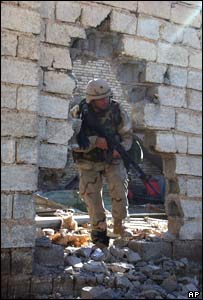
Mohammad and Ayisha Saleem arrived in Britain six days ago. |
A five-year-old Iraqi girl has arrived in Britain, having been orphaned when a US missile destroyed her family's home in Falluja.
Ayisha Saleem was brought here six days ago by her uncle, Mohammad, who decided to leave after the 4 October attack.
The US military says it used precision strikes to take out insurgents loyal to Abu Musab al-Zaqawi.
The attack happened before it stepped up its offensive on the city last week.
Mohammad said he was dazed when he first heard of the bombing.
'Such a crime'
"Why would anybody demolish the house of an innocent family?" he asked.
He said that Ayisha has yet to ask about her mother, uncle and grandparents, but "she knows something has happened".
When he went to his sister's house, he said the experience was traumatic.

US troops have stepped up their campaign to flush out insurgents |
"I found her dead with her unborn baby and a three-year-old son.
"I started wrapping her in blankets but I collapsed.
"When I woke up I can't describe the feelings. I'll never see such a crime in my life, I don't think I'll see such a crime in the future."
He left Falluja shortly after, and said he cannot understand why others have stayed.
"When I left...Falluja I noticed many families still there. I noticed kids playing in the streets so I stopped.
"I asked 'why don't you leave, don't you know the Americans are coming?'
'The guy told me 'we'll never leave Falluja'."
He is highly critical of the American military.
"I think this is mass destruction, a mass punishment for everyone in there.
"I think it's a crime against humanity."
On Friday, the fifth day of the assault, US commanders said they were trying to trap insurgents in Falluja against the River Euphrates in the southern part of the city.
Death toll
A BBC correspondent in the city centre, embedded with US forces and subject to reporting restrictions, says there is no sign of any civilians and the plight of those trapped by the fighting can only be guessed at.
US forces estimate they have killed about 600 insurgents since the assault began on Monday.
They say 18 Americans have been killed and almost 180 wounded in the battle involving some 10,000 US forces and 2,000 Iraqi troops.
Concerns are growing about the humanitarian situation in and around Falluja.
Red Crescent spokeswoman Firdoos al-Ubadi said Falluja was a "disaster", with doctors unable to reach most Iraqi casualties and medical equipment virtually non-existent.
Residents trapped in the battered city said they could smell the stench of decomposing bodies.
